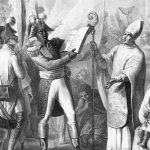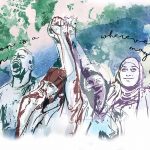Book Review | Affirming a critical universalism
Ghanaian philosopher Ato Sekyi-Otu’s new book argues for a radical universalism that rooted in African thought and experience that finds human freedom in the socialised individual.
Author:
28 February 2019

The great Ghanaian political philosopher, author of the groundbreaking and still essential Fanon’s Dialectic of Experience, Ato Sekyi-Otu, has just published a new book, Left Universalism, Africacentric Essays (Routledge).
Sekyi-Otu is at the height of his prodigious intellectual powers and his new book is a dazzling achievement of obvious and urgent importance. It is a sustained engagement with left political philosophic thought that, while taking a clear critical distance from relativism, demands a new ethics based in and on Africa. In the spirit of Fanon, Left Universalism, Africacentric Essays makes a compelling philosophical and political argument for a critical universalism.
Related article:
Sekyi-Otu’s Fanon’s Dialectic of Experience read Fanon from the perspective of postcolonial Africa and a deep, but always nuanced and critical commitment, to radical alternatives. Published in the mid-1990s, it was part of a new generation of political and philosophical Fanon studies critical of the discursive turn taken by Homi Bhabha and the postcolonial school.
Fanon’s Dialectic came to mark an important moment in the development of Fanon studies, and a significant return to Africa-centered readings of Fanon. But, unfortunately, the book was not, as it should have been, widely read by the wider international left. Left Universalism promises to have a larger resonance and to establish its author as an intellectual whose significance exceeds the field of Fanon studies.
Africana thought
Rejecting postmodern relativism, Left Universalism examines the question of ethics through a delicate and perceptive engagement with Africana thought, postcolonial and feminist philosophers and the work of African novelists, with a meticulous examination of the work of the Ghanaian novelist Ayi Kwei Armah.
Sekyi-Otu is particularly attuned to the nuance and play of language, words and concepts. His fidelity to the ethic of human liberation is well expressed in a footnote concerning Fanon’s use of the term “man”. He quotes Fanon’s comment from Black Skin, White Masks, “All forms of exploitation are identical because all of them are applied against the same ‘object’: the human being.”
Related article:
He adds, “I am rendering Fanon’s l’homme in the French original as ‘the human being’ (rather than ‘man’) in fidelity to the egalitarian presuppositions of his argument. That same fidelity to the inferential logic of Fanon’s antiracism and ours constrains us to subject to relentless criticism abominable non-racial wrongs, indeed, all forms of dehumanisation in postcolonial societies, all inhumanities inflicted on women and men living while human.”
It is in this spirit that Sekyi-Otu returns to Fanon. Left Universalism is not another explication of Fanon but a fine-grained engagement with Fanon as a foundational thinker to engage contemporary problems.
Africacentric universalism
The reader may wonder, why Africacentric universalism? Sekyi-Otu makes clear he is not advancing an Afrocentric programme, or simply reacting to Eurocentrism. Indeed he argues that “to abjure universalism tout court because it is imperialist … is the last word of the imperial act” betraying an “obsessive-compulsive Eurocentrism”, which concedes “ownership of universalism to the West”.
On the contrary, he stresses that putting Africa at the centre is by no means an elision of the rest of the world. Rather, he argues, “Africacentric offers a welcoming home to justifying idioms of moral and political argument, of literary semantics and interpretation, regularly set in mutual opposition.”
It proposes and performs a universalism that is not unmodified but partisan, openly for “Africa’s sake”. The essays perform a partisan and concrete universalism: “an apprehension of an African condition which is unique”, refusing any “grand narrative” of being, history and existence, and which is “the most profoundly human condition”.
Human freedom
His third chapter, “Ethical Communism in African Political Discourse”, includes a sustained study of Armah’s 2002 essay Masks and Marx, in which Armah, committed to the “democratic sharing of power and resources”, proposes to “give communism the image of a central sea of ideas. Into this common sea run tributary rivers from all world’s continents.”
Sekyi-Otu begins with the juxtaposition of “historical communism and the idea of communism”, expressing a central point, namely that the connection and disconnection between notion and reality is far from static.
Recognising that epistemic, political and moral horizons are shaped by context, specific times, places, histories and cultures, Seyki-Otu recognises that the act can transcend context. He questions the assumption that social location determines the knowing of the subject. Against this new dogma he holds to a conception of human freedom and proposes a universalism that is neither a view from nowhere nor exhausted by the situation, while taking seriously the specificity of times and places, histories and cultures to shape epistemic, political and moral horizons.
Related article:
One example of the intriguing paradox is the title of the first chapter, “Is She Not Also a Human Being?”. Translating the Akan question, “na ono so onye onipa?” as “is she not also a human being?”, Sekyi-Otu emphasises the feminine as universal giving the subject a feminine gender absent in the original genderless Akan.
The central thrust of Left Universalism is organised around discussions of universalism and individualism where Sekyi-Otu engages the thought of African philosophers such as Paulin Hountondji of Benin and Kwame Gyekye of Ghana. Sekyi-Otu does not fall back into the old dichotomy of African communalism versus European individualism.
He implicitly follows Marx’s argument that the goal of communism was the socialised individual thus decoupling the idea of individualism from its capitalist form, which is almost hegemonic in this neoliberal period. This view is, Sekyi-Otu argues, reproduced in much of the literature including radicals as seemingly different as the philosophers Kwame Gyekye and Dismas Masolo and the libertarian Marxist George Katsiaficas.
Related article:
With Fanon, he champions individuality with an absolute refusal to reduce the individual to the “possessive” privatised and alienated individual of bourgeois society. It is through Fanon, Hountondji, Olúfẹ́mi Táíwò, Ernst Bloch and Marx, among others, that he argues for a radical, ethically grounded, universalism.
This is a perceptive and brilliant work. Each chapter is powerful and rich and will be read over and over. We are blessed (with apologies to Armah) that Sekyi-Otu has, upon his retirement, returned to his native land – Ghana – and from that new ground, found a new and seemingly boundless energy to create a book that offers such profound insights into a set of the critical questions of our time.




